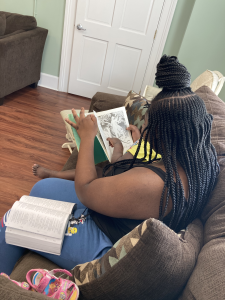Faith House ministers to women and women with children who are experiencing homelessness. We provide a Christ-centered and employment focused program in a trauma-informed environment. Private grants and donors help fund our program, allowing us to provide a drug, alcohol, and controlled substance free environment. Women come due to a variety of reasons, including recovery from trauma, domestic violence, human trafficking, substances, dysfunctional families, and chronic illnesses such as cancer.
 The ministry offers two programs. Our emergency shelter offers a 90-day program where women may come regardless of employment status and without any income. We provide services for free for those without income. If women follow policies and procedures and continue to advance on their goals and objectives, they may request extensions for two weeks at a time. Our transitional living program offer shelter and services for up to one year, with extensions of one month at a time under certain circumstances.
The ministry offers two programs. Our emergency shelter offers a 90-day program where women may come regardless of employment status and without any income. We provide services for free for those without income. If women follow policies and procedures and continue to advance on their goals and objectives, they may request extensions for two weeks at a time. Our transitional living program offer shelter and services for up to one year, with extensions of one month at a time under certain circumstances.
Women staying in either program work with a case manager and a program specialist. The case manager assists women in their journey to self-reliance. She uses the LifeWorks Self-Sufficiency Matrix to help women identify areas of strength and opportunities for growth in areas such as safety, housing, employment, income, credit, food, healthcare, education, literacy, transportation, substance use, life skills, and physical and mental health. The program specialist assists women in th eir journey to healing from trauma. She educates women on Adverse Childhood Experiences and works to build their resiliency skills. She uses the Devereux Adult Resilience Survey to help women discover areas of strength and opportunities for growth in the following four domains: Relationships, Internal Beliefs, Initiative, and Self-Control.
eir journey to healing from trauma. She educates women on Adverse Childhood Experiences and works to build their resiliency skills. She uses the Devereux Adult Resilience Survey to help women discover areas of strength and opportunities for growth in the following four domains: Relationships, Internal Beliefs, Initiative, and Self-Control.
According to Time Magazine’s 3/8/2021 article, “The Key to Building Resilience in a Crisis,” Suniya Luthar, professor emerita at Columbia University Teachers College, shares, “Resilience rests fundamentally on relationships.” She further states, “If you are going to foster anyone’s wellbeing, the first thing you have to do is make sure there is a dependable support network around them[.]”[1] Faith House believes in building relationships and a network of support. One way we do this is through our nightly devotion time using Celebrate Recovery principles. Our motto is “once you are a member of the Faith House family, you are always a member of the Faith House family.”




